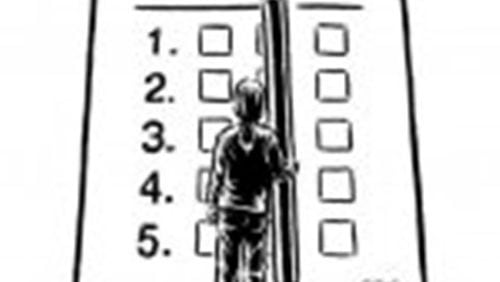As a project manager for TNTP, a national education nonprofit, Shanequa Yates helps metro-Atlanta school systems strengthen their academic strategies.
In this piece, she discusses Senate Bill 364, which is awaiting the governor's signature. The bill reduces the amount of testing tied to teacher performance and lessens the weight of the results in their evaluations.
The bill also reduces the number of Georgia Milestones tests from 32 to 24. Yates addresses that reduction in testing in her piece today.
By Shanequa Yates
Standardized tests are the part of our public education system that everyone loves to hate. There’s a growing consensus here in Georgia and across the country that we’re overtesting our kids—that the time and energy they spend preparing for and taking tests has spiraled out of control. Last fall, for example, a study found the average student in a big-city school system like Atlanta takes 112 standardized tests by the time they graduate from high school.
But after watching the General Assembly cut the end of course exams for science and social studies in grades 3, 4, 6 and 7 and seeing virtually no public explanation as to why those tests were selected over others, I couldn’t help but wonder at the rationale behind the decision. The main talking point was that Georgia required three times as many tests as the federal government—but said nothing of what tests those were, why they were created, or what information they tell us.
Done right, tests are essential tools for providing the education our kids deserve. They help teachers adjust their instruction in real time to fill in gaps in student understanding before they become chasms. And they give parents an honest look at whether their kids are on track—to graduate from high school, to be ready for college or a career, to have the options in life that we all want for our children.
Unfortunately, too many tests are done wrong, and not just at the state or federal levels. School districts often give their own versions of tests that essentially duplicate those already required by state and federal governments. Other tests don’t give teachers results until long after they’ve moved on to new material. Some aren’t even aligned to what students are supposed to be learning. These kinds of tests deserve all the criticism we can heap on them because they create burdens on teachers and students without providing any real educational value in return.
State lawmakers may not deserve all the blame for the testing situation in Georgia, but that doesn’t mean they’re off the hook.
If Georgia is serious about addressing overtesting, the first step is for the Department of Education to work with school districts across the state to find out how many tests are actually being given, what they are, and who exactly is requiring them. Then we can decide which tests aren’t worth our students’ time. Those are the tests we should axe, whether it’s 2 or 20 or anything in between.
As far as I can tell, an audit like that hasn’t happened yet. We have no idea which tests are useful and which ones aren’t, much less who we need to talk to about getting rid of the useless ones. By eliminating a certain number of tests without even knowing which ones are worth tossing, the legislature is essentially performing amputation surgery before they’ve even given the patient a good checkup.
This approach not only defies common sense, but could hurt our schools and our kids. In fact, considering how important science and social studies are, I would argue it already has! As a former teacher in the metro Atlanta area, I consider eliminating the science and social studies tests, or any tests that could give me and the families I served valuable data on my students’ progress in school, a breach of faith.
Aiming for an arbitrary “just right” number of tests sounds nice, but it’s not going to solve Georgia’s overtesting problem. While the existing bill will likely be signed by the governor, it’s not too late for state education officials to step back, take stock of the tests our students are taking, recommit to the valuable ones—and then figure out how to eliminate the bad or duplicative ones.
In fact, now is the perfect time. Because cutting tests for the sake of cutting them is just as bad for our students as testing for the sake of testing.







